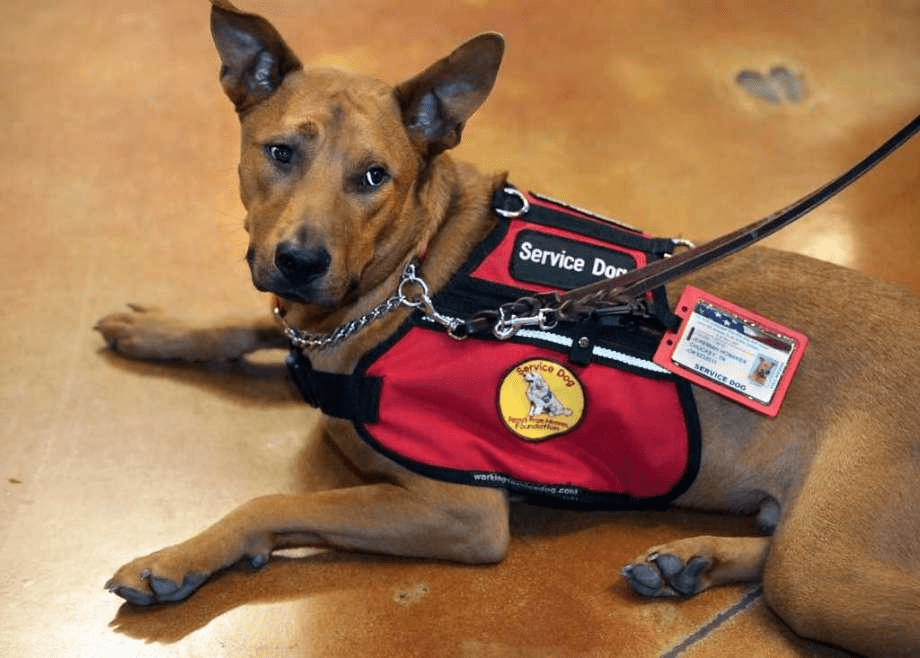A service dog is a dog that is professionally trained to provide a service or perform tasks specifically to assist someone with a mental, physical or intellectual disability.
Service dogs are an increasingly popular treatment for disabilities. They can provide companionship, security and reassurance as well as performing tasks that many people with disabilities would be unable to do without their service animal.
Usually, a service dog is never considered a pet, and has been trained from birth to be a service animal. In some cases, however, pets may be eligible to be trained as service animals.
Before deciding if a service animal is right for you, it’s a good idea to first check to laws and regulations regarding service animals to make sure you are eligible.
There are many factors considered when determining eligibility such as age, type of disability, other treatments the person with a disability has tried or is currently using, and how the animal can specifically help the disabled person.
Service Dog Eligibility Requirements
Age. Age requirements often vary according to state and service dog trainer. For example, some states require handlers to be of age 14 and older, and some require handlers to be at least 18 years old. Requirements can also vary by disability. Some dog training providers require handlers suffering from PTSD to be over 21 before they are eligible for a service dog.
Treatment. Many states and service dog training centers require a person with a disability to undergo other types of treatment, such as conventional therapy, for a certain length of time before they are eligible for a service animal. It is sometimes required for handlers to continue seeing a therapist along with the services they receive from their service animal.
Handler requirements. Handlers must be physically and cognitively capable (to some extent) of participating in the service dog’s training. If the person is unable to independently handle and provide cues or commands for the service dog in some way, it may not be the right type of support.
Handlers should also be able to meet the physical, emotional and financial needs of the service animal, as well as providing a stable home for the dog to live. It’s also important that the handler has no other dogs as pets.



Eligible Physical Disabilities
The Americans with Disabilities Act (ADA) defines physical disabilities as follows:
“Any physiological disorder or condition, cosmetic disfigurement, or anatomical loss affecting one or more of the following body systems: neurological, musculoskeletal, special sense organs, respiratory (including speech organs), cardiovascular, reproductive, digestive, genitourinary, hemic and lymphatic, skin, and endocrine.”
Physical disabilities that may be eligible for a service dog include but are not limited to sensory issues such as blindness or deafness (full and partial), mobility issues such as paralysis, multiple Sclerosis, Autism, Epilepsy and Bone and Skeletal disabilities such as Osteoporosis and Scoliosis.
Eligible Mental Disabilities
Mental disabilities are defined by the ADA as “Any mental or psychological disorder, such as mental retardation, organic brain syndrome, emotional or mental illness, and specific learning disabilities.”
Potentially eligible mental disabilities include Bipolar Disorder, Post Traumatic Stress Disorder, Anxiety, Depression, Obsessive Compulsive Disorder, Mood Disorders, Adjustment disorders, Social Anxiety, Separation Anxiety, Eating Disorders, Neurocognitive disorders, psychotic disorders and substance abuse disorders.
Having a disability on the eligibility list is not enough to make someone eligible for a service animal. A recommendation from a medical professional and a record of the person’s disability is required, and the reason the service animal is necessary must be listed. A person with a disability that is not severe may not be eligible, as the disability must affect some major area of daily life. For example, a person who suffers from seizures only once or twice in a year may not have a huge need for a service animal. Even if a person suffers from a severe disability, there still must be a valid reason a service animal could improve the quality of life of the person. If the service animal does not seem necessary or helpful to a specific disability, the disabled person may not be eligible.
As requirements can vary across states and service training providers, it’s a good idea to look into the Assistance Dogs International (ADI) database for more in-depth information specific to each state and training program.
A service dog can be a huge support to people with a range of disabilities as they can make a huge difference in a person’s quality of life. Before pursuing treatment through a service dog, it’s important to make sure the disabled person meets all requirements in order to be eligible for a service animal. After researching eligibility factors and talking to your physician or therapist, you may find that a service dog may be the right treatment for you.
